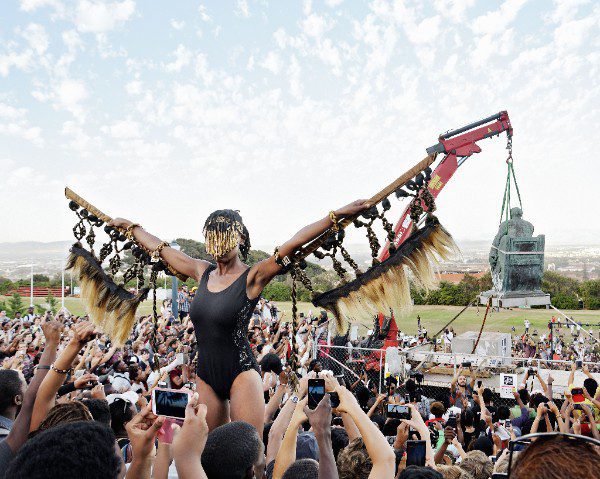Framer Framed, Amsterdam, Netherlands
28 Aug 2016 - 27 Nov 2016

Sethembile Msezane - Chapungu - The Day Rhodes Fell (2015)
Framer Framed presents a unique collaborative exhibition, Re(as)sisting Narratives, curated by Chandra Frank.
The exhibition explores lingering legacies of colonialism between South Africa and the Netherlands through engaging with contemporary artists from both countries. Re(as)sisting Narratives is the result of a two-year project with South African based partners: District Six Museum and Centre for Curating the Archive. Participating artists explore broader themes such as race, gender, memory, trauma and spatiality in their work. This multi-media group exhibition features Mary Sibande, Sethembile Msezane, Mohau Modisakeng, Athi-Patra Ruga, Burning Museum Collective, Toni Stuart & Kurt Orderson, and Judith Westerveld. The artists in this show are connected by a shared interest in evoking and readdressing that what is left behind, that what is (in)visible, and a visual fusion of reality and fantasy to create new ways of being.
Presented in this exhibition are onsite-made wheat pastes and enlarged photocopies by Burning Museum, coming forth out of their project Straatpraatjies, which questions, ‘What would historical transcriptions in the present landscape look like’? The collective uses music, language and space to interrupt the grammatical structure of city architecture. Poet Toni Stuart and filmmaker Kurt Orderson present the installation Krotoa-Eva’s Suite: a cape jazz poem in three movements, which challenges the dominant male colonial narration of history through centering Krotoa-Eva’s interior life; while Westerveld’s video installation, The Remnant, and series, Echolocation, investigate the remainders of constructed barriers and spatial violence as a result of Dutch colonialism in South Africa.
Mohau Modisakeng’s video art pieces Ga Bose Gangwe and Inzilo, an isiZulu word for ‘mourning’, speak to the enactment of ritual and healing, simultaneously alternating between inward and outward gestures, with the Ditoala Series (VII and XIII) offering a commentary on the Black body within the South African post-colonial context. Similarly, Athi-Patra Ruga’s The Night of the Long Knives I, from the ongoing performance series The Future White Women of Azania, centers the body and comments on a pre-and post-apartheid state, but through evoking fantastical characters adorned with colorful balloons. The tapestry UnoZuko reflects embroidered narratives of future imaginings and inhabitants of Azania.
Both the work of Mary Sibande and Sethembile Msezane speak to the multiplicity of Black womanhood. Sibande’s installation, Conversations with Madam CJ Walker, evokes speculative fiction in which transnational connections are addressed, whereas Sethembile Msezane uses performance to address the absence of Black women’s bodies in memorialized public spaces. Both Chapungu – The Day Rhodes Fell and Untitled (Freedom Day) reflect Msezane’s performance art, illuminating the failures of the New South Africa and the transformative potential of current student protests.
The opening takes places on Sunday August 28, at 17:00. Including a unique performance by artist Toni Stuart.
From 23 November – 13 December 2016 the exhibition is also on view in an adapted version at District Six Museum in Cape Town, South Africa.
Parallel to its exhibitions, Framer Framed organises events to contextualise and/or respond to the exhibition and corresponding themes. All events are free unless explicitly stated.